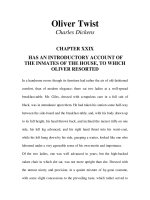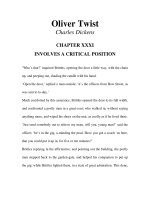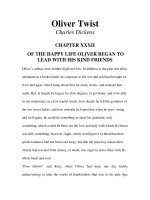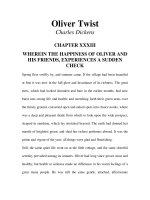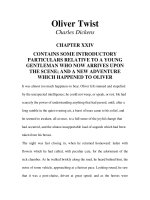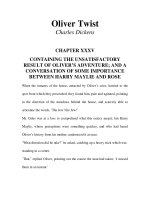Tài liệu LUYỆN ĐỌC TIẾNG ANH QUA TÁC PHẨM VĂN HỌC-JANE EYRE CHARLOTTE BRONTE Chapter 34 doc
Bạn đang xem bản rút gọn của tài liệu. Xem và tải ngay bản đầy đủ của tài liệu tại đây (43.77 KB, 17 trang )
JANE EYRE
CHARLOTTE BRONTE
Chapter 34
It was near Christmas by the time all was settled: the season of general
holiday approached. I now closed Morton school, taking care that the parting
should not be barren on my side. Good fortune opens the hand as well as the
heart wonderfully; and to give somewhat when we have largely received, is
but to afford a vent to the unusual ebullition of the sensations. I had long felt
with pleasure that many of my rustic scholars liked me, and when we parted,
that consciousness was confirmed: they manifested their affection plainly
and strongly. Deep was my gratification to find I had really a place in their
unsophisticated hearts: I promised them that never a week should pass in
future that I did not visit them, and give them an hour's teaching in their
school.
Mr. Rivers came up as, having seen the classes, now numbering sixty girls,
file out before me, and locked the door, I stood with the key in my hand,
exchanging a few words of special farewell with some half-dozen of my best
scholars: as decent, respectable, modest, and well-informed young women as
could be found in the ranks of the British peasantry. And that is saying a
great deal; for after all, the British peasantry are the best taught, best
mannered, most self- respecting of any in Europe: since those days I have
seen paysannes and Bauerinnen; and the best of them seemed to me
ignorant, coarse, and besotted, compared with my Morton girls.
"Do you consider you have got your reward for a season of exertion?" asked
Mr. Rivers, when they were gone. "Does not the consciousness of having
done some real good in your day and generation give pleasure?"
"Doubtless."
"And you have only toiled a few months! Would not a life devoted to the
task of regenerating your race be well spent?"
"Yes," I said; "but I could not go on for ever so: I want to enjoy my own
faculties as well as to cultivate those of other people. I must enjoy them
now; don't recall either my mind or body to the school; I am out of it and
disposed for full holiday."
He looked grave. "What now? What sudden eagerness is this you evince?
What are you going to do?"
"To be active: as active as I can. And first I must beg you to set Hannah at
liberty, and get somebody else to wait on you."
"Do you want her?"
"Yes, to go with me to Moor House. Diana and Mary will be at home in a
week, and I want to have everything in order against their arrival."
"I understand. I thought you were for flying off on some excursion. It is
better so: Hannah shall go with you."
"Tell her to be ready by to-morrow then; and here is the schoolroom key: I
will give you the key of my cottage in the morning."
He took it. "You give it up very gleefully," said he; "I don't quite understand
your light-heartedness, because I cannot tell what employment you propose
to yourself as a substitute for the one you are relinquishing. What aim, what
purpose, what ambition in life have you now?"
"My first aim will be to CLEAN DOWN (do you comprehend the full force
of the expression?)--to CLEAN DOWN Moor House from chamber to
cellar; my next to rub it up with bees-wax, oil, and an indefinite number of
cloths, till it glitters again; my third, to arrange every chair, table, bed,
carpet, with mathematical precision; afterwards I shall go near to ruin you in
coals and peat to keep up good fires in every room; and lastly, the two days
preceding that on which your sisters are expected will be devoted by Hannah
and me to such a beating of eggs, sorting of currants, grating of spices,
compounding of Christmas cakes, chopping up of materials for mince-pies,
and solemnising of other culinary rites, as words can convey but an
inadequate notion of to the uninitiated like you. My purpose, in short, is to
have all things in an absolutely perfect state of readiness for Diana and Mary
before next Thursday; and my ambition is to give them a beau-ideal of a
welcome when they come."
St. John smiled slightly: still he was dissatisfied.
"It is all very well for the present," said he; "but seriously, I trust that when
the first flush of vivacity is over, you will look a little higher than domestic
endearments and household joys."
"The best things the world has!" I interrupted.
"No, Jane, no: this world is not the scene of fruition; do not attempt to make
it so: nor of rest; do not turn slothful."
"I mean, on the contrary, to be busy."
"Jane, I excuse you for the present: two months' grace I allow you for the
full enjoyment of your new position, and for pleasing yourself with this late-
found charm of relationship; but THEN, I hope you will begin to look
beyond Moor House and Morton, and sisterly society, and the selfish calm
and sensual comfort of civilised affluence. I hope your energies will then
once more trouble you with their strength."
I looked at him with surprise. "St. John," I said, "I think you are almost
wicked to talk so. I am disposed to be as content as a queen, and you try to
stir me up to restlessness! To what end?"
"To the end of turning to profit the talents which God has committed to your
keeping; and of which He will surely one day demand a strict account. Jane,
I shall watch you closely and anxiously--I warn you of that. And try to
restrain the disproportionate fervour with which you throw yourself into
commonplace home pleasures. Don't cling so tenaciously to ties of the flesh;
save your constancy and ardour for an adequate cause; forbear to waste them
on trite transient objects. Do you hear, Jane?"
"Yes; just as if you were speaking Greek. I feel I have adequate cause to be
happy, and I WILL be happy. Goodbye!"
Happy at Moor House I was, and hard I worked; and so did Hannah: she was
charmed to see how jovial I could be amidst the bustle of a house turned
topsy-turvy--how I could brush, and dust, and clean, and cook. And really,
after a day or two of confusion worse confounded, it was delightful by
degrees to invoke order from the chaos ourselves had made. I had previously
taken a journey to S- to purchase some new furniture: my cousins having
given me CARTE BLANCHE TO effect what alterations I pleased, and a
sum having been set aside for that purpose. The ordinary sitting-room and
bedrooms I left much as they were: for I knew Diana and Mary would derive
more pleasure from seeing again the old homely tables, and chairs, and beds,
than from the spectacle of the smartest innovations. Still some novelty was
necessary, to give to their return the piquancy with which I wished it to be
invested. Dark handsome new carpets and curtains, an arrangement of some
carefully selected antique ornaments in porcelain and bronze, new coverings,
and mirrors, and dressing-cases, for the toilet tables, answered the end: they
looked fresh without being glaring. A spare parlour and bedroom I
refurnished entirely, with old mahogany and crimson upholstery: I laid
canvas on the passage, and carpets on the stairs. When all was finished, I
thought Moor House as complete a model of bright modest snugness within,
as it was, at this season, a specimen of wintry waste and desert dreariness
without.
The eventful Thursday at length came. They were expected about dark, and
ere dusk fires were lit upstairs and below; the kitchen was in perfect trim;
Hannah and I were dressed, and all was in readiness.
St. John arrived first. I had entreated him to keep quite clear of the house till
everything was arranged: and, indeed, the bare idea of the commotion, at
once sordid and trivial, going on within its walls sufficed to scare him to
estrangement. He found me in the kitchen, watching the progress of certain
cakes for tea, then baking. Approaching the hearth, he asked, "If I was at last
satisfied with housemaid's work?" I answered by inviting him to accompany
me on a general inspection of the result of my labours. With some difficulty,
I got him to make the tour of the house. He just looked in at the doors I
opened; and when he had wandered upstairs and downstairs, he said I must
have gone through a great deal of fatigue and trouble to have effected such
considerable changes in so short a time: but not a syllable did he utter
indicating pleasure in the improved aspect of his abode.
This silence damped me. I thought perhaps the alterations had disturbed
some old associations he valued. I inquired whether this was the case: no
doubt in a somewhat crest-fallen tone.
"Not at all; he had, on the contrary, remarked that I had scrupulously
respected every association: he feared, indeed, I must have bestowed more
thought on the matter than it was worth. How many minutes, for instance,
had I devoted to studying the arrangement of this very room?--By-the-bye,
could I tell him where such a book was?"
I showed him the volume on the shelf: he took it down, and withdrawing to
his accustomed window recess, he began to read it.
Now, I did not like this, reader. St. John was a good man; but I began to feel
he had spoken truth of himself when he said he was hard and cold. The
humanities and amenities of life had no attraction for him--its peaceful
enjoyments no charm. Literally, he lived only to aspire--after what was good
and great, certainly; but still he would never rest, nor approve of others
resting round him. As I looked at his lofty forehead, still and pale as a white



